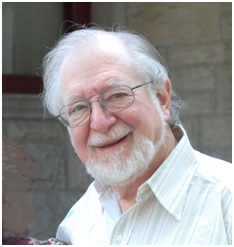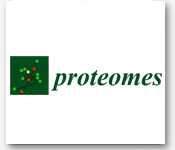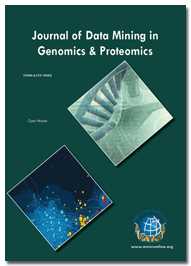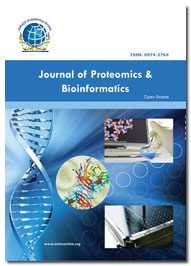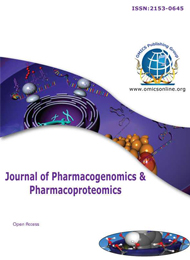Theme: Current Trends and Challenges of Protein Dynamics
Protein Engineering 2015
The OMICS Group is organizing International Conference on Protein Engineering which is going to be held during October 26-28, 2015 at Chicago, USA will bring together world-class scientists, biologists, bioinformaticians, geneticist, researchers and academicians to discuss related fields in Protein Engineering.
Protein engineering is the process of developing useful proteins with much research taking place into the understanding of protein folding and recognition for protein design principles. Protein Engineering-2015 deals with the following topics like protein purification and protein expression service, protein modification, protein dietary supplements, molecular cell biology, biomolecular engineering conferences, biological engineering conferences, computational biology, Bioprocess, Biologics, biotherapeutics, Antibody-Derived Molecules, Purifying Antibodies, Protein aggregation and stability, ADCs, Antibody-Drug Conjugates conference, Engineering bispecific antibodies. The main theme of the conference is Current Trends and Challenges of Protein Dynamics.
OMICS International organises 1000+ Global Events every year in Conference series, on Clinical, Medicine, Pharma and Science & Technology every year across USA, Europe, Asia, Middle East, Australia and UK with support from 1000 more scientific societies and Publishes 700+ open access journals which contains over 100000 eminent personalities, reputed scientists as editorial board and organizing committee members.
The Protein Engineering is now gained approval with a market size estimated at some $33 billion in 2004 and reached $70 billion by the end of the decade. In 2012, the market is $56 billion and increased to 168 billions in 2017, at a compound annual growth rate (CAGR) of 10.9% from 2012 through 2017. On the basis of products, the protein crystallization market has segments such as reagents/consumables and instruments, which are accounted for 85% of the protein crystallization & crystallography product market. It is expected to grow at a high CAGR of 11% over the forecast period. The global market was valued at $775 million in 2013 and is expected to reach $1,253 million by 2018.
For more details, please visit: Protein Engineering Analysis Report
For more conferences from Omics International, kindly go through conference series page.
OMICS International Conferences invites all the participants from all over the world to attend 'International Conference on Protein Engineering' during October 26-28, 2015 in Chicago, USA which includes prompt keynote presentations, Oral talks, Poster presentations and Exhibitions.
Track 1: Protein Engineering
Protein Engineering is the process of developing useful or valuable proteins and it research takes place into the understanding of folding and recognition for protein design principles. Researchers will have more detailed knowledge on In vitro evolution of proteins, Aspects of Biocatalysis, Advances in engineering proteins for biocatalysis, Protein Engineered Biomaterials and many topics. Computational Protein Engineering, Constructing functional biocatalysts and Growth of synthetic biology are also commonly used topics in protein engineering. Protein Engineering market is estimated to grow at a CAGR of 15.7% to reach $1,463.0 million by 2020. There are almost 3000 people from 60-65 universities in USA working for Protein Engineering and there are several conferences and workshops like biomolecular engineering conferences, molecular cell biology workshops, protein engineering conferences, antibody engineering 2015 are conducting throughout the year globally.
Relevant Conferences
Annual Conference and Expo on Biomaterials, March 14-16, 2016 London, UK; 2nd International Conference on Synthetic Biology, August 15-17, 2016 London, UK; 6th International Conference & Expo on Proteomics, March 29-30, 2016 Atlanta, USA; International Conference on Biochemistry, October 13-15, 2016 Kuala Lumpur, Malaysia; International Conference on Nucleic Acids, August 04-06, 2016 Seattle, USA; 12th Annual PEGS BOSTON, April 25-29, 2016 Boston, USA; Proteins & Antibodies Congress, April 18-19, 2016 London, UK ; Gordon Research Conference on Protein Folding Dynamics, January 10-15, 2016 Texas, USA; 18th International Conference on Protein-Protein Interactions January 07-08, 2016 Singapore; Gordon Research Conference on Protein Processing, Trafficking & Secretion, July 2016 New Hampshire, USA.
Track 2:Antibody Engineering
Antibodies are unique in their high affinity and specificity for a binding partner, a quality that has made them one of the most useful molecules for biotechnology and biomedical applications. The field of Antibody Engineering has changed rapidly in the past 10 years, fueled by Engineering bi-specific antibodies, Phage and Yeast Display of Antibodies, Bi specific antibodies & combination therapy and Antibodies for cancer therapy. Whereas human antibody gene libraries and synthetic antibody libraries are also prominent subject in Antibody Engineering. There are almost 4000+ people from 75 universities in USA working for Antibody Engineering and there are several symposiums like structural biology symposiums, protein engineering symposium, biological engineering symposium and many more throughout globally.
Relevant Conferences
Annual Conference and Expo on Biomaterials, March 14-16, 2016 London, UK; 2nd International Conference on Synthetic Biology, August 15-17, 2016 London, UK; 6th International Conference & Expo on Proteomics, March 29-30, 2016 Atlanta, USA; International Conference on Biochemistry, October 13-15, 2016 Kuala Lumpur, Malaysia; International Conference on Nucleic Acids, August 04-06, 2016 Seattle, USA; 12th Annual PEGS BOSTON, April 25-29, 2016 Boston, USA; Proteins & Antibodies Congress, April 18-19, 2016 London, UK; Gordon Research Conference on Protein Folding Dynamics, January 10-15, 2016 Texas, USA; 18th International Conference on Protein-Protein Interactions January 07-08, 2016 Singapore; Gordon Research Conference on Protein Processing, Trafficking & Secretion, July 2016 New Hampshire, USA.
Track 3: Enzyme Engineering
Enzyme Engineering is the application genetic engineering techniques to enzyme technology. There are a number of properties which may be improved or altered by genetic engineering including the yield and kinetics of the enzyme, Structure of the enzymes, De novo design, Intersection of protein engineering and next-generation sequencing, Rational alteration of enzyme function, Combinatorial Enzyme Engineering and Enzyme and biosensor Engineering. There are almost 4000+ people from 75 universities in USA working for Enzyme Engineering and there are several events and meetings like computational biology events, protein engineering events, protein engineering meeting, protein synthesis events, protein engineering conference, protein engineering Chicago, protein engineering usa, protein dietary supplements meetings.
Relevant Conferences
International Conference on Next Generation Sequencing, July 21-22, 2016 Berlin, Germany; 7th International Conference and Expo on Proteomics, October 24-26, 2016 Rome, Italy; International Conference on Nucleic Acids, August 04-06, 2016 Seattle, USA; 2nd International Conference and Exhibition on Antibodies, July 14-15, 2016 Philadelphia, USA; International Conference on Biochemistry, October 13-15, 2016 Kuala Lumpur, Malaysia; 18th International Conference on Enzyme, June 06-07, 2016 New York, USA; The 4th International Conference on Enzyme, June 01-03, 2016 Nanjing, China; International Conference on Enzyme Engineering and Biomedical Sciences, January 18-19, 2016 San Diego, USA; 7th International Symposium of Enzyme & Biocatalysis, March 16-18, 2016 Seoul, South Korea; The Fifth International Conference on Cofactors & Active Enzyme Molecules, September 04-08, 2016 Unazuki, Japan.
Track 4: Applications of Proteins
There are lot of applications used for protein but mainly we are having good research and number of companies and projects for the following applications Protein modification, targeting and degradation, Protein identification and validation, Protein profiling studies in diabetes, Imaging mass spectrometry and profiling of tissue sections, Designer proteins and Protein Dietary Supplements. This market is $56 billion in 2012 to $168 billion in 2017, a compound annual growth rate (CAGR) of 10.9% from 2012 through 2017. There are almost 3000 people from 60-65 universities in USA working for Protein Engineering.
Relevant Conferences
World Congress on Amino Acids and Proteins, December 08-09, 2016 Baltimore, USA; Asia Pacific Mass Spectrometry Congress October 10-12, 2016 Kuala Lumpur, Malaysia; 7th International Conference and Expo on Proteomics, October 24-26, 2016 Rome, Italy; 6th International Conference on Bioinformatics, March 29-30, 2016 Valencia, Spain; International Conference on Nucleic Acids, August 04-06, 2016 Seattle, USA; 9th Annual World Protein & Peptide Conference, April 25-28, 2016 Dalian, China; 41st Lorne Conference on Protein Structure and Function, February 07-11, 2016 Victoria, Australia; Gordon Research Conference on Protein Processing, Trafficking & Secretion, July 24-29, 2016 New Hampshire, USA; Proteins & Antibodies Congress, April 18-19, 2016 London, UK; 12th Annual PEGS BOSTON, April 25-29, 2016 Boston, USA.
Track 5: Structure and Function of Proteins
Proteins are the most versatile macromolecules in living systems and serve crucial functions in essentially all biological processes. The structure and function of proteins includes Function prediction methods, Homology and Structure based methods, Genomic context-based methods, Protein Storage and Plasmid Construction, Mutagenesis Experiments to test protein stability/function and Protein structure modeling. This market is $56 billion in 2012 to $168 billions in 2017, a compound annual growth rate (CAGR) of 10.9% from 2012 through 2017.
Relevant Conferences
7th International Conference and Expo on Proteomics, October 24-26, 2016 Rome, Italy; 3rd International Conference on Genomics, & Pharmacogenomics, September 21-23, 2015 San Antonio, USA; International Conference on Nucleic Acids, August 04-06, 2016 Seattle, USA; World Congress on Amino Acids and Proteins December 08-09, 2016 Baltimore, USA; 6th International Conference on Bioinformatics, March 29-30, 2016 Valencia, Spain; The 3rd Conference on Protein and Proteomics, March 02-04, 2016 Beijing, China; Gordon Research Conference on Protein Folding Dynamics, January 10-15, 2016 Texas, USA; 41st Lorne Conference on Protein Structure and Function, February 07-11, 2016 Victoria, Australia; 9th Annual World Protein & Peptide Conference, April 25-28, 2016 Dalian, China; 18th International Conference on Protein-Protein Interactions January 07-08, 2016 Singapore.
Track 6: Pharmacogenomics & Pharmacoproteomics
Pharmacogenomics & Pharmacoproteomics is the study of the role of genetics in drug response and provided DNA for genomes. It deals with the influence of acquired and inherited genetic variation on drug response in patients byProtein aggregation and stability in biopharmaceuticals, New discoveries in genomic targets, Various drug responses due to genetic polymorphisms, Drug dosage formulations, Drug safety and its efficacy and Membrane transport proteins. There are almost 3000 people from 60-65 universities in USA working for Proteomics. The NIH Pharmacogenomics Research Network (PGRN) is a network of scientists funding to PharmGKB since 2000.
Relevant Conferences
7th International Conference and Expo on Proteomics, October 24-26, 2016 Rome, Italy; 3rd International Conference on Genomics, & Pharmacogenomics, September 21-23, 2015 San Antonio, USA; International Conference on Nucleic Acids, August 04-06, 2016 Seattle, USA; World Congress on Amino Acids and Proteins, December 08-09, 2016 Baltimore, USA; 6th International Conference on Bioinformatics, March 29-30, 2016 Valencia, Spain; 41st Lorne Conference on Protein Structure and Function, February 07-11, 2016 Victoria, Australia; 9th Annual World Protein & Peptide Conference, April 25-28, 2016 Dalian, China; 18th International Conference on Protein-Protein Interactions January 07-08, 2016 Singapore; The 3rd Conference on Protein and Proteomics, March 02-04, 2016 Beijing, China; Gordon Research Conference on Protein Folding Dynamics, January 10-15, 2016 Texas, USA.
Track 7: Recombinant of Protein Expression
Protein Expression consists of the stages after DNA has been transcribed to messenger RNA (mRNA) from the process of Optimizing protein expression, Prokaryotic and Eukaryotic systems, Cell line & cell culture development, Fusion protein therapeutics and Protein microarray studies. Recombinant production of proteins is one of the most powerful techniques used in the Life Sciences. There are almost 3000 people from 60-65 universities in USA working for Protein Expression. The Oxford Protein Production Facility-UK (OPPF-UK) is a UK core facility for protein production located in the Research Complex at Harwell. The project has recently received further funding of £2.3M from the MRC to provide a range of highly specialized technologies incorporating robotic systems, for the high throughput expression, purification and crystallization of recombinant proteins.
Relevant Conferences
6th International Conference & Expo on Proteomics, March 29-30, 2016 Atlanta, USA; 6th International Conference on Bioinformatics, March 29-30, 2016 Valencia, Spain; International Conference on Nucleic Acids, August 04-06, 2016 Seattle, USA; International Conference on Biochemistry October 13-15, 2016 Kuala Lumpur, Malaysia; World Congress on Amino Acids and Proteins December 08-09, 2016 Baltimore, USA; 18th Annual Recombinant Protein Expression, January 19-20, 2016 San Diego, USA; The Essential Protein Engineering Summit, April 25-29, 2016 Boston, USA; 12th Annual Recombinant Protein Therapeutics, January 18-19, 2016 San Diego, USA; 18th International Conference on Protein-Protein Interactions January 07-08, 2016 Singapore; Gordon Research Conference on Protein Folding Dynamics, January 10-15, 2016 Texas, USA.
Track 8:Mass Spectrometry in Proteome Research
Proteomics is an emerging field that has been highly enabled by the human genome project. Proteins are the products of genes, the machinery of the cells in our bodies. Protein mass spectrometry refers to the application of mass spectrometry to the study of proteins. Mass spectrometry is an important emerging method for the characterization of proteins. Two-dimensional gel electrophoresis can be used to create cellular protein maps which give a quantitative and qualitative picture of the proteome. Mass spectrometry is the method of choice for the rapid large-scale identification of these proteomes and their modifications. Proteogenomics uses mass spectrometry data to experimentally validate gene products and to assist in the process of genome annotation and comparison. There are almost 3000 people from 60-65 universities in USA working for Proteomics. Research Awards in the amount of $35,000 each are presented annually. Two awards are fully sponsored by Thermo Scientific and Waters Corporation.
Relevant Conferences
International Conference on Biochemistry, October 13-15, 2016 Kuala Lumpur, Malaysia; World Congress on Chromatography, September 10-12, 2016 Amsterdam, Netherlands; 2nd International Conference on Current Trends in Mass Spectrometry, May 09-11, 2016 Chicago, USA; 6th International Conference & Expo on Proteomics, March 29-30, 2016 Atlanta, USA; World Congress on Amino Acids and Proteins, December 08-09, 2016 Baltimore, USA; 12th Annual PEGS BOSTON, April 25-29, 2016 Boston, USA; 41st Lorne Conference on Protein Structure and Function, February 07-11, 2016 Victoria, Australia; Gordon Research Conference on Protein Processing, Trafficking & Secretion, July 2016, New Hampshire, USA ; International Conference on Protein-Protein Interactions January 07-08, 2016 Singapore; 9th Annual World Protein & Peptide Conference, April 25-28, 2016 Dalian, China.
Track 9: Molecular Interaction
Molecular Interaction holds atoms together within molecules. While Molecular docking and computational evolutionary biology is the latest research and also involves the Applications of genomics, Genome analysis, Machine learning in molecular systems biology, Current challenges in modeling cellular metabolism and Directed Evolution Strategy for the latest research with new technologies. A UNL research team led by evolutionary geneticist Jay Storz has received a $1.4 million grant from the National Institutes of Health for continued research into mechanisms of protein evolution.
Relevant Conferences
6th International Conference on Genomics & Pharmacogenomics September 22-24, 2016 Berlin, Germany; 2nd International Conference on Synthetic Biology, August 15-17, 2016 London, UK; International Conference on Biochemistry, October 13-15, 2016 Kuala Lumpur, Malaysia; 6th International Conference & Expo on Proteomics, March 29-30, 2016 Atlanta, USA; World Congress on Amino Acids and Proteins December 08-09, 2016 Baltimore, USA; Conference on Molecular Interaction Engineering, June 2016 Karlsruhe, Germany; Gordon Research Conference on Molecular & Ionic Clusters, January 17-22, 2016 California, USA; The 2nd Conference on Advances in Biochemistry and Molecular Biology, March 18-20, 2016 Los Angeles, USA; International Conference on Protein-Protein Interactions January 07-08, 2016 Singapore; Gordon Research Seminar on Molecular Interactions & Dynamics, July 09-10, 2016 Massachusetts, USA.
Track 10: Applications of Transcriptomics
Transcriptomics is the study of the transcriptome, the complete set of RNA transcripts that are produced by the genome, under specific circumstances or in a specific cell using high-throughput methods, such as Role of microRNA (miRNA) and small interfering RNA (siRNA). Transcriptomic approaches in order to identify mechanisms that coordinate alternative splicing regulation in embryonic stem cells and in a model of cancer stem cells responsible for the most prevalent primary brain tumors. Protein complex as an emerging target for development of anticancer drugs and suggested a mechanism of facilitates chromatin transcription action during transcription and cell differentiation. There are almost 3000 people from 60-65 universities in USA.
Relevant Conferences
2nd International Conference on Transcriptomics, August 18-20, 2016 Portland, Oregon USA; 7th International Conference on Bioinformatics, October 27-28, 2016 Chicago, USA; International Conference on Biochemistry, October 13-15, 2016 Kuala Lumpur, Malaysia; 7th International Conference and Expo on Proteomics, October 24-26, 2016 Rome, Italy; International Conference on Nucleic Acids, Aug 04-06, 2016 Seattle, USA; Genetics in Forensics Congress, March 14-15, 2016 London, UK; 18th International Conference on Bioengineering and Bioscience Engineering, June 09-10, 2016 San Francisco, USA; The Fourteenth Asia Pacific Bioinformatics Conference, January 11-13, 2016 San Francisco, USA; 6th International Conference on Bioscience, Biochemistry and Bioinformatics, January 23-25, 2016 Pattaya, Thailand; 41st Lorne Conference on Protein Structure and Function, February 07-11, 2016 Victoria, Australia.
Scope and Importance
Protein engineering is the process of developing useful proteins with much research taking place into the understanding of protein folding and recognition for protein design principles.
Protein engineering has for decades been a powerful tool in biotechnology for generating vast numbers of useful enzymes for industrial applications. There will be challenging topics related to the protein dynamics in the field of protein engineering.
Why it’s in Chicago, USA
The study and research of the protein engineering is top in USA when compared to the Europe and Asia. Protein Engineering related companies and products are mostly found in USA. The well developed technologies related to protein are used in universities in USA
Societies Associated with Protein Engineering
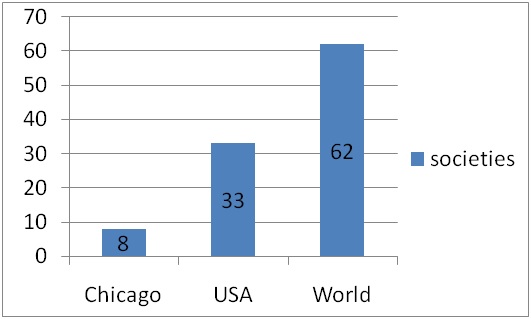
Chicago Major Protein Engineering Societies
a) Chicago Biomedical Consortium
USA Major Protein Engineering Societies
a) Federation of American Societies for Experimental Biology
b) American Society for Microbiology
c) American Society for Cell Biology (ASCB)
World Major Protein Engineering Societies
a) The Antibody Society
b) African Society for Bioinformatics and Computational Biology
c) Biochemical society
d) Royal Society of Chemistry
e) International Federation for Cell Biology
Universities Associated with Protein Engineering
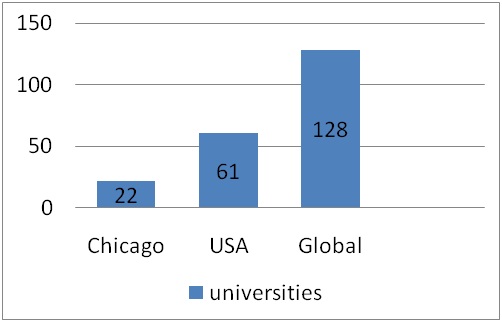
Top Universities in Chicago:
- University of Chicago
- University of Illinois at Urbana-Champaign
- Northwestern University
- University of Illinois at Chicago
- Northern Illinois University
Top Universities in USA:
- Princeton University
- Harvard University
- Yale University
- Columbia University
- Stanford University
Top Universities in Worldwide:
- California Institute of Technology (Caltech)
- University of Oxford
- Stanford University
- Massachusetts Institute of Technology (MIT)
- Princeton University
- University of Cambridge
- University of California, Berkeley
Market Value on Protein Engineering
This market is $56 billion in 2012 to $168 billions in 2017, a compound annual growth rate (CAGR) of 10.9% from 2012 through 2017
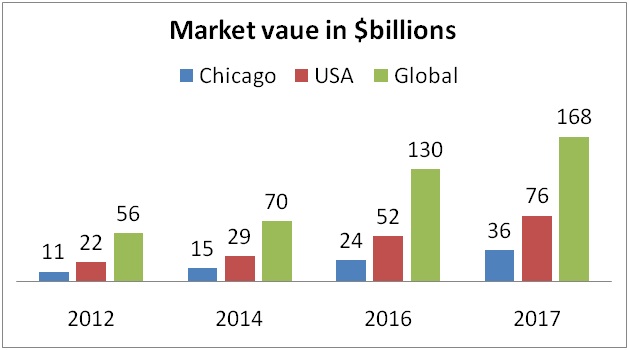
Market Growth of Protein Engineering from 2013-2018
Protein crystallization is the most crucial and the largest segment, and it accounted for 47% of the market in 2013. On the basis of products, the protein crystallization market has segments such as reagents/consumables and instruments. Reagents/consumables accounted for 85% of the protein crystallization & crystallography product market. It is expected to grow at a high CAGR of 11% over the forecast period. The global market was valued at $775 million in 2013 and is expected to reach $1,253 million by 2018.
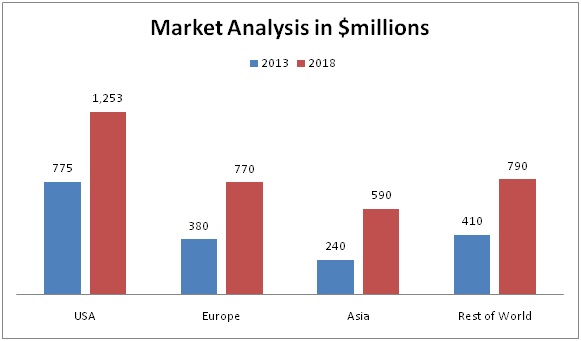
Fund Allotment to Protein Engineering
Announcement of the Ministry of Economy and Competitiveness R & D
They allotted 125.5 million euro's, aims to fund research projects of high quality experimental or theoretical orientation. As well, the announcement of R & D Oriented Challenges Company has 244 million, to which must be added a new category 20.5, R & D for young researchers without bonding or bonding time.
Statistics of Researchers, Academicians and Students working on Protein Engineering
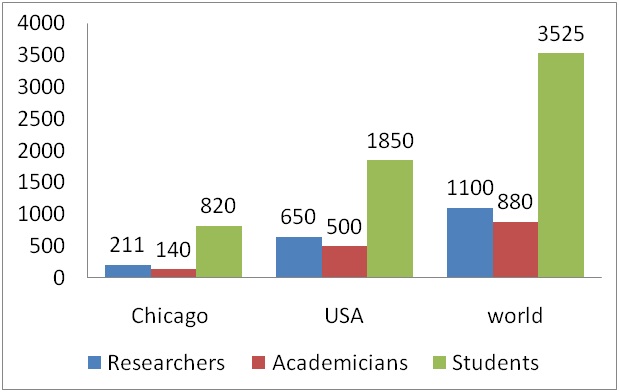
References:
- http://www.marketsandmarkets.com/PressReleases/protein-antibody-engineering.asp
- Annual Reports, SEC Filings, IUCr, ACA, ECA, SCANZ, CrSJ, AsCA, Expert Interviews, and MarketsandMarkets Analysis
- http://www.uv.es/uvweb/college/en/research-tech-transfer/uv-research/news-1285855271161.html
Conference Highlights
- Protein Engineering
- Antibody Engineering
- Enzyme Engineering
- Applications of Proteins
- Structure and Function of Proteins
- Pharmacogenomics and Pharmacoproteomics
- Mass Spectrometry in Proteome Research
- Recombinant Protein Expression
- Molecular Interaction
- Protein Purification
- Protein Therapeutics and Market Analysis
- Biofilm Associated Protein
To share your views and research, please click here to register for the Conference.
To Collaborate Scientific Professionals around the World
| Conference Date | October 26-28, 2015 | ||
| Sponsors & Exhibitors |
|
||
| Speaker Opportunity Closed | Day 1 | Day 2 | Day 3 |
| Poster Opportunity Closed | Click Here to View | ||
Useful Links
Special Issues
All accepted abstracts will be published in respective Our International Journals.
- Journal of Proteomics & Bioinformatics
- Journal of Data Mining in Genomics & Proteomics
- Journal of Pharmacogenomics & Pharmacoproteomics
Abstracts will be provided with Digital Object Identifier by








